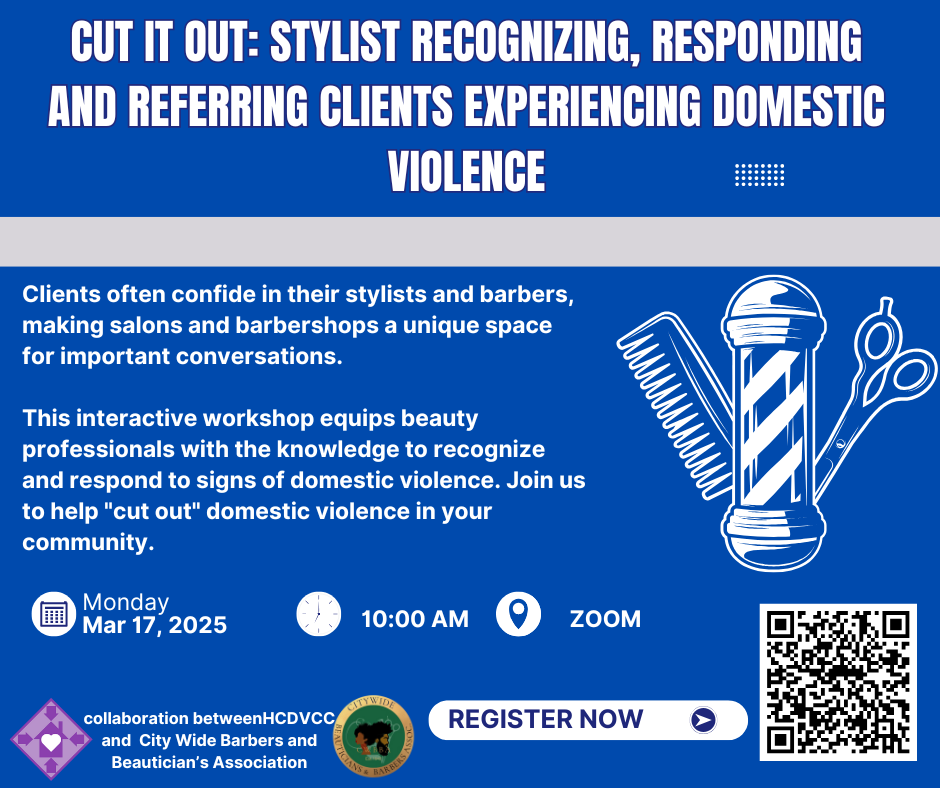Reflecting on a Powerful Domestic Violence Awareness Month
As October comes to an end, the pressing issue of gender-based violence, particularly domestic violence, remains at the forefront of our mission. Throughout Domestic Violence Awareness Month (DVAM), the Harris County Domestic Violence Coordinating Council (HCDVCC), alongside our incredible community partners, dedicated time to amplifying the conversation around recognizing, responding to, and making referrals for domestic violence.
Throughout the month, the HCDVCC team had the privilege of supporting our partners at various events, including The Bridge, Fresh Spirit, Aid to Victims of Dometic Abuse (AVDA), and An Nisa Hope Center, who graciously invited us to participate in their galas and luncheons.
The Communications Department was busy during October appearing on KPRC, FOX 26 and KHOU discussing important issues about Domestic Violence. Thank you to all the stations for making domestic violence a feature during October. HCDVCC also participated in a panel discussion with AVDA, The Bridge, the District Attorney’s Office and the Houston Police Department at the United Way’s Interagency Meeting discussing issues and resources related to domestic violence for their Community Partners.
We partnered with AVDA and Daya to host an Interfaith Community Dialogue on Domestic Violence. Advocates were joined by Faith Leaders for table talk discussions on Domestic Violence. After the Dialogue, we held an evening of Remembrance, Caring and Hope to celebrate survivors and honor those we lost to domestic violence in the last year. We were honored to have several families who lost a loved one join us for this moving event.
On October 9th, our Senior Director of Operations and Communications, Amy Smith, had the unique opportunity to meet with ten members of the Korean National Police Agency and provide training on the dynamics of domestic violence, Coordinated Community Responses (CCR), Risk Assessments, and Safety Planning. During their three-week visit to Houston, hosted by Sam Houston State University’s College of Criminal Justice, the group also met with representatives from the Harris County Sheriff’s Office, Houston Police Department, and other local agencies to compare international approaches to protecting vulnerable populations.
Thecia Jenkins, our Training and Outreach Director, participated in an event that was hosted in collaboration with State Representative Jolanda Jones and AVDA. This impactful session focused on identifying lethality risks in domestic violence situations and preventing abuse by promoting healthy relationships. Attendees were able to access real-time resources and connect with one another, sharing personal stories and finding support.
Our Voices of Freedom ambassadors—a remarkable group of survivors who have thrived and now lead as advocates—spearheaded a four-part social media series on Facebook. These posts addressed critical topics such as dismantling domestic violence myths, the journey from victimization to advocacy, engaging men in the conversation, faith-based responses to abuse, and the importance of self-care for both survivors and advocates.
Our Education and Outreach team was quite active this month partnering with local colleges and universities to lead discussions on healthy relationships. They reached over 700 youth and young adults, sparking conversations on domestic violence prevention.
The Team hosted a Family Fun Day in partnership with Village Green. This was one of the highlights of the month—a fun-filled day emphasizing the importance of community connections. This event also served as a precursor to next year’s Youth Boot Camp on Healthy Relationships.
The Team also hosted two outreach workshops one on Creating a Culture of Care: How healthy relationships and bystander intervention can make a difference. The participants learned essential skills to foster healthy relationships and intervene in potentially harmful situations. The second workshop was an Accountability Walk or Taking Responsibility for Our Actions and Ending Violence. This powerful, interactive activity allowed participants to step into the shoes of domestic violence offenders, raising awareness of the challenges they face on the road to rehabilitation.
This October also saw HCDVCC’s Client Support Groups engage in a creative and therapeutic project, where participants—mothers and children—used art to envision their personal, professional, and psychological futures.
We were honored to be in the company of amazing people and agencies when HCDVCC received one of Harris County District Attorney Kim Ogg’s Community Partner Awards.
While October has come to an end, our work is far from over. As we move toward the end of this year and into 2025, let’s continue to have these crucial conversations and advocate for those affected by domestic violence. Together, we can keep making a difference.









 They rush the relationship and say things like, “I’ve never felt this way before” within days or weeks.
They rush the relationship and say things like, “I’ve never felt this way before” within days or weeks. Talk to someone you trust – A parent, school counselor, teacher, coach, or friend. You don’t have to do this alone.
Talk to someone you trust – A parent, school counselor, teacher, coach, or friend. You don’t have to do this alone. Love Is Respect – Call
Love Is Respect – Call 











